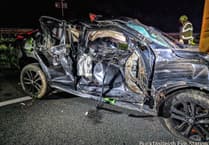AMID the wreckage of Woking Borough Council’s effective bankruptcy residents will have one overriding concern: Who pays?
To which they may add: “And how much?”
The initial impact on residents is likely to be felt at the meeting of Full Council next Tuesday (20 June) when the Section 114 notice, issued by the council last Wednesday and a recognition that Government help is urgently needed to address the crushing debt burden, will be discussed by councillors.
The section 114 can be seen as an inevitable next step in the council’s response to “unprecedented financial challenges”, as it describes them, but even so the scale of the debt remains staggering.
The 114 notice describes a deficit of £1.2billion, set against core funding – comprising council tax, business rates and government grants – of £16million. The debt portfolio acquired by the council is put at £1.8bn, the notice says, which is, it adds, “out of step with the funding streams available”.
For added context, the report notes: “The financial deficit identified in this council has the highest ratio compared to the resource base of any major council in recent years. The expected deficit at 31 March 2024 (£1.181bn) is estimated to be 107 times greater than the amount raised in council tax in each financial year (£11m).”
Cllr Ann-Marie Barker, the leader of the majority Liberal Democrat council, said: “In the meeting [on 20 June] Julie Fisher [the council chief executive] will respond and make her broad recommendations on what happens next. It will be around having a recovery plan, working with government and filling our budget gap.
“It’s worth noting that there are two separate, but connected, financial issues facing the council: a £1.2bn funding deficit arising from past financial practices; and a £9.5m gap in the day-to-day budget for running the council.
“We will need support from Government on the £1.2bn deficit.
“And we will have to look at how we provide services and do things in a different way in future. We are looking for innovative ways of providing services that may involve working with partners and the voluntary sector.
“We will need to take difficult decisions. We are working through this process now but it will be vitally important to support services for those most in need. These are decisions the council will need to take to bridge the £9.5m budget gap.
“Increases in council tax would be a drop in the ocean in terms of dealing with the £1.2bn deficit, but I know it is of huge concern to residents.”
Croydon council, another authority to declare effective bankruptcy, this year received government permission to raise its council tax by 15%, which sets a worrying yardstick for residents.
The section 114 makes two further points which will offer residents little comfort.
“The enriched service suite that the borough has enjoyed over a number of years will need to be removed or alternative funding sources found,” the report says.
It also makes the observation that “It is fair and reasonable, given the circumstances, that the council take all possible steps to mitigate the level of financial support needed from Government in order to set the council’s affairs on an appropriate financial course.”
What those steps may involve is not clear, but addressing the point, Cllr Barker’s Lib Dem colleague Adam Kirby, who represents Horsell, said: “The ‘who pays?’ question is key for me now and this is now the core moral mission of anyone elected in Woking.
“It is completely unreasonable of the Government to expect cuts and tax rises for residents without offering some form of tangible support. Central government has a share of blame for allowing, facilitating and encouraging the decade of unbalanced budgets.
“Central government now faces its own choice of continuing the fiction that they are getting their money back from Woking Borough Council - they aren’t as debt is serviced with new debt - or doing a realistic deal.
“Residents deserve a fair deal and while I'm sure they may accept a degree of pain for a financially sustainable future, they cannot be expected to shoulder this alone.”
The debate about just what that fair deal looks like will begin on Tuesday.




